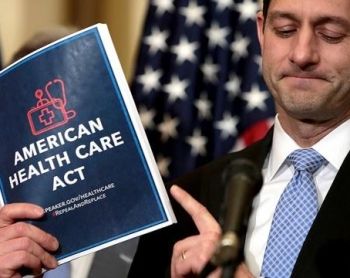
Publisher:
Bonnie King
CONTACT:
Newsroom@Salem-news.com
Advertising:
Adsales@Salem-news.com

~Truth~
~Justice~
~Peace~
TJP
May-05-2017 12:07

 TweetFollow @OregonNews
TweetFollow @OregonNews
House Voted to Repeal ObamaCare -- What's Next?
Ralph E. Stone Salem-News.comRepublicans control both chambers in 32 states, including 17 with veto-proof majorities.
 |
(SAN FRANCISCO) - Understandably there is much sturm und drang over the U.S. House of Representatives vote to repeal the Patient Protection and Affordable Care Act or ObamaCare, and replace it with the American Health Care Act (AHCA).
I suspect the major reason for the repeal is because it was called ObamaCare by most people. The antipathy toward Barack Obama continues.
The repeal was voted on before the nonpartisan Congressional Budget Office (CBO) had a chance to analyze the legislation, which is highly unusual for major legislation. But according to the CBO, a similar, earlier version of the AHCA would have reduced the number of insured by 24 million people by 2026 and would have raised premiums by 15% to 20% before they began to drop.
I suspect the CBO analysis of the present version of the AHCA will be similarly negative. I bet the rush to pass the legislation before the CBO analysis was intentional as a negative CBO analysis might have swayed some House members to vote "no," considering the vote was close, 217 to 213.
Now the AHCA will move to the U.S. Senate where, hopefully, it will be viewed more critically. The Senate will, for example, have the CBO analysis by then.
House Minority Leader Nancy Pelosi (D.Calif.) warned that no matter what the Senate does with this legislation, House members who voted for the AHCA will have a "scar they will carry" from that vote, and that they will be "forever identified" with the vote.
What I take this to mean is that those House members who voted for repeal of ObamaCare will be vulnerable in the midterm elections in 2018. This assumes, of course, that the Democrats can come up with viable candidates and campaign funding to unseat incumbent Republicans.
Unfortunately, the Democratic Party has been neglecting the state and local levels of government, where many future candidates for national office hone their skills and connect with district voters.
Consider that Republicans control both chambers in 32 states, including 17 with veto-proof majorities. Those 32 states cover 61% of the U.S. population.
Republican also have 33 governors. Democrats, meanwhile, control the legislature in just 13 states, amounting to 28% of the country’s population; only five of those chambers have veto-proof majorities.
While many House members who voted for repeal may be vulnerable at the midterm elections, the Democratic National Committee has its work cut out finding viable candidates and campaign funding to unseat these incumbent Republican House members.
Articles for May 4, 2017 | Articles for May 5, 2017 |




Quick Links
DINING
Willamette UniversityGoudy Commons Cafe
Dine on the Queen
Willamette Queen Sternwheeler
MUST SEE SALEM
Oregon Capitol ToursCapitol History Gateway
Willamette River Ride
Willamette Queen Sternwheeler
Historic Home Tours:
Deepwood Museum
The Bush House
Gaiety Hollow Garden
AUCTIONS - APPRAISALS
Auction Masters & AppraisalsCONSTRUCTION SERVICES
Roofing and ContractingSheridan, Ore.
ONLINE SHOPPING
Special Occasion DressesAdvertise with Salem-News
Contact:AdSales@Salem-News.com

Terms of Service | Privacy Policy
All comments and messages are approved by people and self promotional links or unacceptable comments are denied.
[Return to Top]
©2026 Salem-News.com. All opinions expressed in this article are those of the author and do not necessarily reflect those of Salem-News.com.